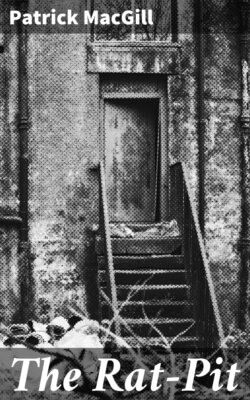Читать книгу The Rat-Pit - Patrick MacGill - Страница 18
На сайте Литреса книга снята с продажи.
I
ОглавлениеTable of Contents
JAMES Ryan’s cabin lay within half a mile of the sea, and his croft, a long strip of rock-bespattered, sapless land, ran down to the very shore. But this strip of land was so narrow that the house, small though it was, could not be built across, and instead of the cabin-front, an end gable faced the water. In Frosses most of the land is divided into thin strips, for it is the unwritten law that they who have no land touching the sea may not lift any sea-weed to manure their potato patches. In Frosses some of the crofts, measuring two miles in length, are seldom more than eight paces in width at any point.
All over the district gigantic boulders are strewn, huge rocks that might have been flung about in play by monstrous Giants who forgot, when their humour was at an end, to gather them up again. Between these rocks the people till for crops, plots of land which seldom measure more than four yards square, and every rock conceals either a potato patch or cornfield. It was said years ago that Frosses had twenty-one blades of grass to the square foot, but this was contradicted by a sarcastic peasant, who said that if grass grew so plentifully with them they would all be wealthy.
Fishing was indulged in, but very little fish was ever landed: Scottish and English trawlers netted the fish off-shore, and few were picked up by the peasantry, whose boats and nets were of the most primitive pattern. The nets were bad, the boats, mere curraghs, were untrustworthy, and a great deal of the fishermen’s time was usually spent in baling out water. At best fishing was for them an almost profitless trade. They had no markets and no carts to send their fish to town. For the most part the fishers used the fish themselves or traded them in kind with their neighbours.
On the morning following the women’s visit to Greenanore two men came up from the sea towards the door of James Ryan’s cabin. One was an old man, bearded and wrinkled, whose brows were continually contracting as is the habit with those who live by the sea and look on the wrath of many winds. He was dressed in a white wrapper, a woollen shirt, open at the neck, trousers folded up to the knees, and mairteens. The other was a youth of nineteen, dark-haired, supple of limb and barefooted. In the two men a family likeness might be detected; they were father and son, James Ryan and his only boy, Fergus. There were now only four in the family; death had taken away most of the children before they were a year old.
Fergus opened the door of the cabin, to be met with the warm and penetrating breath of the cattle inside. The cows, always curious to see a new-comer, turned round in their beds of fresh heather and fixed their big, soft eyes on the youth. Beside the cow nearest the door, a young calf, spotted black and white, turned round on long, lank, awkward legs and sniffed suspiciously; then, finding that no danger was going to befall him, snuggled up against his mother, who commenced to lick her offspring with a big rough tongue. Suddenly a pig ran in from the outside, rushed between the youth’s legs and disappeared under the bed. Its back was bleeding as if a dog had bitten it.
“Is not the pig’s flesh like a human’s?” said Fergus, turning to his father. “White; almost without hair and it bleeds just like a man’s. I hate pigs; I wish we could live without keeping them.... Oh! here is Norah at the fire. Have you just got up?”
The child, shivering from cold, was sitting on the hassock, her hands spread out to the peat blaze.
“She has only just come in from the other side of the water,” said the mother, who was sitting up in bed, knitting stockings. “She lay out all night, poor creature! Twenty-seven women in all were lying out on the snow. And she got no yarn! Thanks be to God! but it’s a bad time.”
“A bad time, a hard time, a very hard time!” said the old man, sitting down on an upturned creel and taking off his mairteens. “No yarn! and there was not a fish in all the seas last night.”
“None but the ones we didn’t catch,” said Fergus. “It is that dirty potato-basket of a boat that is to blame.... Are you cold, Norah?”
“I am only shivering; but the fire will do me good.”
“She didn’t ate one bit of her breakfast yesterday,” said the mother. “Left it all for you when you came in from the sea, she did!”
Norah blushed as if she had been caught doing something wrong; then drank from the bowl of milk which was placed on the floor beside her. The father looked greedily at the bowl; the mother spoke.
“It is nice and warm, that milk,” said the old woman. “I wish we had more of it, but at this time of the year the milk runs thin in the cow’s elldurs. But even if we had got enough bread, never mind milk, it would not be so bad.... And there is not one bit for you this morning.... Do you know what the soggarth says, Shemus?”
